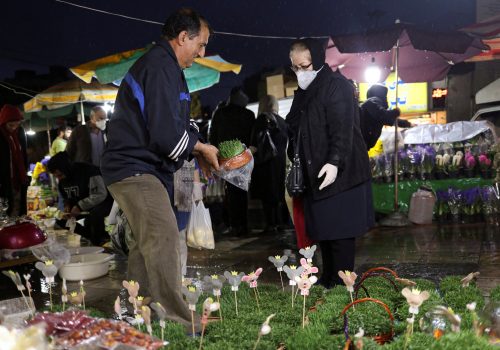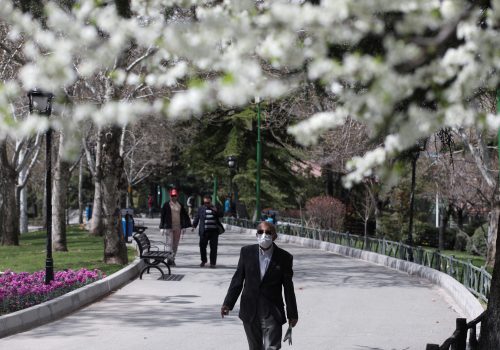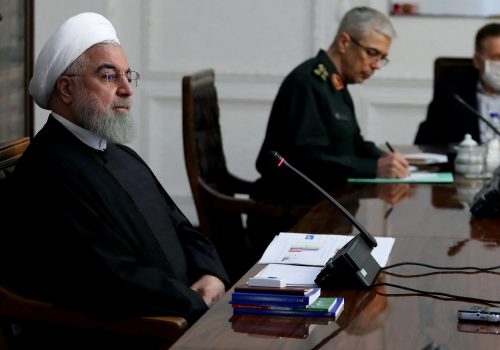Pressure mounts on Trump to ease sanctions on Iran amid COVID-19 outbreak
Members of Congress, world leaders, international organizations, editorial boards, and civil society activists are calling on the Trump administration to lift sanctions on Iran, at least temporarily, while the country fights the coronavirus pandemic. Previous US administrations, under Barack Obama and George W. Bush, both temporarily eased sanctions on Iran in times of crisis after earthquakes hit the country in 2003 and 2012. The Trump administration is being urged to do the same, considering sanctions have limited Iran’s ability to import much-needed medical supplies to fight the spread of COVID-19, and to provide financial safety nets to its population under quarantine.
Iran has been ravaged by the coronavirus in the past two months and the virus continues to spread. Iran has already suffered more than 47,500 cases of infection across the country and 3,160 deaths. Experts and hospital sources inside the country say the real number of cases are much more than the official figures. Researchers at Iran’s prestigious Sharif University of Technology have concluded that under the worst-case scenario, if the government doesn’t take strict quarantine measures and the public doesn’t follow guidelines closely, up to 3.5 million Iranians could die of the virus at the peak of the pandemic in late May.
The Iranian government was late in acknowledging the existence of COVID-19 and has been slow in combating the spread. A lack of transparency from the government combined with a high level of mistrust from the public has provided space for large amounts of misinformation targeting Iranians and an inadequate response among the public. Powerful religious figures resisted the government’s orders to close shrines and halt religious ceremonies when the virus first started spreading from the holy city of Qom into other cities and towns. Now the government is trying to catch up to the rapid spread of the virus with more aggressive measures and serious messaging, including a lockdown.
In mid-March, Iran’s Central Bank chief asked the International Monetary Fund for a $5 billion emergency loan from the organization’s Rapid Financing Instrument to combat the pandemic. Iranian Foreign Minister Mohammad Javad Zarif has also published a list of urgent medical supplies and equipment needed by Iranian health workers, such as ventilators and protective gear.
In the United States, two dozen Democratic members of Congress led by prominent progressives Bernie Sanders and Elizabeth Warren in the Senate, and Alexandria Ocasio Cortez and Ilhan Omar in the House of Representatives, have signed a letter calling on the Trump administration to halt sanctions on Iran so the country can fight the deadly virus.
Former Vice President Joe Biden has also asked the US government to clear humanitarian channels to Iran, and to assure companies and organizations that they will not be subject to US sanctions if they help Iran’s COVID-19 response.
World leaders and foreign diplomats have also urged the US government to offer sanctions relief to Iran under the current crisis. Pakistan’s Prime Minister Imran Khan pleaded to President Donald Trump via Twitter, and several European governments requested the US to consider reducing economic pressure on Iran. Secretary-General of the United Nations, Antonio Guterres, and the Human Rights Commissioner, Michelle Bachelet, were among prominent leaders who asked the US to consider easing sanctions while the world is grappling with this pandemic.
Numerous media reports have documented the negative impact of US sanctions on Iran’s fight against the deadly virus, and dozens of opinion pieces have called on President Trump to follow his predecessors and ease sanctions. The New York Times Editorial Board wrote that easing the “maximum pressure” would be a “wise diplomatic move.” A former Obama administration official has also explained steps the US government can take to ease sanctions to address this crisis without “undermining the administration’s overall sanctions objectives.”
US-based activists have launched digital campaigns to protest sanctions using the hashtag #EndCOVIDSanctions on Twitter and Instagram. Iranian-Americans have been posting videos of themselves describing how sanctions impact their families in Iran who are fighting the outbreak of the deadly coronavirus.
Dozens of prominent academics across the US and Canada, such as Noam Chomsky, have signed a petition saying it is “unjust” to leave Iranians alone in this global crisis and how it violates their rights to health and access to medical care.
The Trump administration, however, has not yet shown much interest in easing the pressure on Iran. In fact, the US government has announced new sanctions against the country since the COVID-19 crisis began.
The Trump administration’s views are seemingly in line with hawks in Washington who have been striving for a collapse of the Iranian government for years and may even see this crisis as an opportunity for that to happen. As Ben Friedman, policy director at Defense Priorities and adjunct professor at George Washington University, explained to this author: “The Trump administration’s insistence on keeping sanctions in place on Iran as it battles coronavirus—and given sanctions’ obvious failure to date—suggests that cruelty isn’t a necessary byproduct of sanctions, it’s the point.”
However, the reality has been far from the wish of regime collapse. Rather, the past four decades of US policy on Iran have shown that sanctions and pressure further weaken the country’s moderate forces and civil society and instead strengthen the more hawkish elements of the Iranian political structure.
The coronavirus knows no borders or politics. It spreads fast and wide across borders and country lines. Helping Iran contain it is not only in the interest of 80 million Iranians, but also millions of their neighbors in countries where wars and violence have destroyed health systems and reduced the ability to fight catastrophes of this magnitude. Some of Iran’s neighbors—such as Qatar, Kuwait, and the United Arab Emirates—have understood this and rushed to help the country with financial assistance and humanitarian aid. But that is not enough. The international community, as well as countries in the region, must call on the Trump administration to lift sanctions on Iran, albeit temporarily, so that Tehran can access necessary resources to control this disease and the rest of the world can have an open and easy channel to help.
The Islamic Republic should also extend a humanitarian gesture to the American people and the world, by releasing foreign and dual nationals who have been imprisoned on various “security” and “espionage” charges in Iran. Some of these prisoners have been temporarily released on furlough but are not fully free. Tehran’s leadership should let these prisoners leave the country to return to their loved ones in this time of global crisis, and to ensure their health and safety at a time when prisons are one of the hardest places to contain the virus. Doing so could open a diplomatic window of opportunity between Tehran and Washington and help reduce months of tensions at a time when the entire world population should be united against our common enemy: coronavirus.
Negar Mortazavi is an Iranian-American journalist and political commentator based in Washington, DC. Follow her on Twitter: @NegarMortazavi.
Image: A family wear protective face masks and gloves, amid fear of coronavirus disease (COVID-19), as they walk by the iconic Freedom Square, in Tehran (Reuters)


